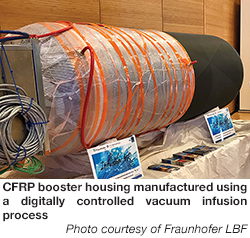Integrated sensors secure and monitor manufacturing of thick-walled CFRP structures
14/04/2020
‘Infusion 4.0’, a project funded by the German Federal Ministry of Economics and Energy, shows how effective fibre-optic sensors are at monitoring the vacuum infusion process during the production of large composite components. Together with its project partner, MT Aerospace AG, the Fraunhofer Institute for Structural Durability and System Reliability LBF has made the previously hidden process steps visible and digitally controllable, thereby increasing process reliability. This new and efficient manufacturing technology supports the fast and reliable development of aerospace products.Using carbon fibre-reinforced plastic (CFRP) booster housings, MT Aerospace AG, in Augsburg, Germany, manufactures large CFRP components using vacuum infusion processes. In vacuum infusion, a dry-wrapped preform is inserted into a vacuum bag and is infiltrated with resin while slowly rotating in an oven. Intelligent sensors are required in order to monitor the flow front of the in-flowing resin and to optimise processes. Scientists from Fraunhofer LBF and their industrial partners are embedding fibre-optic sensors into the component as early as the winding process in various three-dimensional positions. These then control resin distribution during this important production step.
 Each sensor fibre contains several of the 60+ glass fibre sensors. The flow front is the line when the resin first comes into contact with the dry fibres. The signals are transmitted from the rotating part in the oven to an outside computer in situ in order to digitally monitor the process. A digital representation of the sensor position on the component shows when the flow front reaches the sensor. Martin Lehmann, Research Associate at Fraunhofer LBF, explained: “We are receiving transparent information for the manufacturing process of these thick-walled parts for this first time. This increases process reliability for vacuum infusion processes.”
Each sensor fibre contains several of the 60+ glass fibre sensors. The flow front is the line when the resin first comes into contact with the dry fibres. The signals are transmitted from the rotating part in the oven to an outside computer in situ in order to digitally monitor the process. A digital representation of the sensor position on the component shows when the flow front reaches the sensor. Martin Lehmann, Research Associate at Fraunhofer LBF, explained: “We are receiving transparent information for the manufacturing process of these thick-walled parts for this first time. This increases process reliability for vacuum infusion processes.”The new manufacturing process makes previously hidden processes visible and digitally controllable, thereby increasing process stability. Information gained by resin flow monitoring ensures reproducibility and quality of the new product, enabling timely intervention if required during production. Production ramp-up can be accelerated with this improved control. This increases the company’s competitiveness.
In addition, the new technology makes future automated control of manufacturing processes in Industry 4.0 possible. Integrated sensors provide structural health monitoring (SHM), even from the earliest phase of the product lifecycle.
This ‘Infusion 4.0’ project idea won third place in the INNOspace Masters Challenge offered by the German Aerospace Center (DLR) in 2017. It was a finalist at the 2018 German Aviation Innovation Award for research needs in this environment. The project’s successful completion in October 2019 confirmed the Darmstadt scientists’ approaches as well as those of their Augsburg colleagues.
The ‘Infusion 4.0 – flow front detection in the vacuum infusion process of a CFRP booster housing using fibre-optic sensors’ project was funded by the German Federal Ministry of Economics and Energy and approved by a resolution of the German Bundestag.
www.lbf.fraunhofer.de/infusion40
https://innospace-masters.de/mt-aerospace